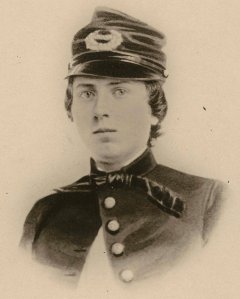On the morning of Thursday, 6 November, the White House held the Medal of Honor ceremony for First Lieutenant Alonzo H. Cushing, whose actions have been detailed in a number of articles and stories, as well as my last post. C-SPAN broadcast the ceremony with remarks from President Barack Obama. Present at the awarding were Helen Loring Ensign, Cushing’s cousin twice removed who accepted the medal, as well as a number of other relatives and historian Margaret Zerwekh, who helped bring Cushing’s story to light and campaigned for this award. I have embedded the video below and included the text of the citation; there are few other words I can add to expand upon his selfless devotion and disregard for his own safety as he fulfilled his duty at the most crucial point in a battle that is considered to have determined the course of the American Civil War and the future of the Union of the United States.
CITATION: The President of the United States of America, authorized by Act of Congress, March 3rd, 1863, has awarded in the name of Congress the Medal of Honor to First Lieutenant Alonzo H. Cushing, United States Army.
First Lieutenant Alonzo H. Cushing distinguished himself by acts of bravery above and beyond the call of duty while serving as an artillery commander in Battery A, 4th U.S. Artillery, Army of the Potomac at Gettysburg, Pennsylvania on July 3rd, 1863 during the American Civil War.
That morning, Confederate forces led by General Robert E. Lee began cannonading First Lieutenant Cushing’s position on Cemetery Ridge. Using field glasses, First Lieutenant Cushing directed fire for his own artillery battery. He refused to leave the battlefield after being struck in the shoulder by a shell fragment. As he continued to direct fire, he was struck again — this time suffering grievous damage to his abdomen.
Still refusing to abandon his command, he boldly stood tall in the face of Major General George E. Pickett’s charge and continued to direct devastating fire into oncoming forces. As the Confederate forces closed in, First Lieutenant Cushing was struck in the mouth by an enemy bullet and fell dead beside his gun.
His gallant stand and fearless leadership inflicted severe casualties upon Confederate forces and opened wide gaps in their lines, directly impacting the Union force’s ability to repel Pickett’s charge. First Lieutenant Cushing’s extraordinary heroism and selflessness above and beyond the call of duty at the cost of his own life are in keeping with the highest traditions of military service and reflect great credit upon himself, Battery A, 4th U.S. Artillery, Army of the Potomac, and the United States Army.
